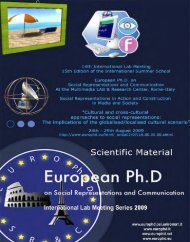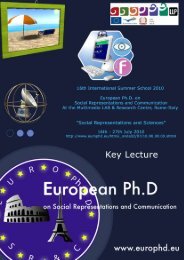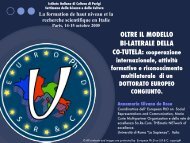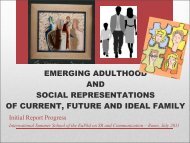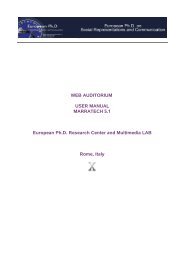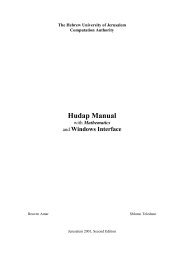The "boomerang" effect of the radicalism in discourse analysis
The "boomerang" effect of the radicalism in discourse analysis
The "boomerang" effect of the radicalism in discourse analysis
Create successful ePaper yourself
Turn your PDF publications into a flip-book with our unique Google optimized e-Paper software.
“If we say that people are liv<strong>in</strong>g <strong>in</strong> a false consciousness, we are assum<strong>in</strong>g that <strong>the</strong>re is a “reality” (<strong>in</strong><br />
which <strong>the</strong>y are oppressed) which lies outside <strong>of</strong> <strong>the</strong>ir understand<strong>in</strong>g <strong>of</strong> <strong>the</strong> world; i.e. it is a version <strong>of</strong> events<br />
that is more valid or truthful. (...) But <strong>the</strong> idea that <strong>the</strong>re is one version <strong>of</strong> events that is true (mak<strong>in</strong>g all o<strong>the</strong>r<br />
false) is also <strong>in</strong> direct opposition to <strong>the</strong> central idea <strong>of</strong> social constructionism. (...) Because <strong>the</strong>re can be no<br />
truth, all perspectives must be equally valid. Different viewpo<strong>in</strong>ts can <strong>the</strong>refore only be assessed <strong>in</strong> relation to<br />
each o<strong>the</strong>r (hence “relativism”) and not with respect to some ultimate standard or truth. (...) Given that an<br />
explicit aim <strong>of</strong> <strong>the</strong> social constructionist is to “deconstruct” <strong>the</strong> <strong>discourse</strong>s which uphold <strong>in</strong>equitable power<br />
relations and to demonstrate <strong>the</strong> way <strong>in</strong> which <strong>the</strong>y oscure <strong>the</strong>se, it is difficult to see how it is possibile to do<br />
this without fall<strong>in</strong>g back upon some notion <strong>of</strong> “reality” or “truth” that <strong>the</strong> <strong>discourse</strong>s are supposed to oscure.”<br />
(Burr, 1995, p. 80-82)<br />
To summarise, <strong>the</strong> <strong>the</strong>ses set forth <strong>in</strong> this paragraph can lead to <strong>the</strong> conclusion that <strong>the</strong><br />
RDA, putt<strong>in</strong>g it forward as a clearly relativist <strong>the</strong>ory (thus also contestualist and plurialist)<br />
does not affirm its relativity; on <strong>the</strong> contrary it affirms its unconditioned truth with a<br />
rhetorical strategy aimed at self-legitimization. Paradoxically, <strong>the</strong> RDA ends up with<br />
propos<strong>in</strong>g aga<strong>in</strong> an ontological and dogmatic vision, based on <strong>the</strong> follow<strong>in</strong>g <strong>the</strong>ses:<br />
1. <strong>the</strong> radical relativism is set <strong>in</strong> a non relativisable situation;<br />
2. <strong>the</strong> radical relativism, <strong>in</strong> <strong>the</strong> self-referentiality presumed <strong>in</strong> <strong>the</strong> <strong>discourse</strong>, bars <strong>the</strong><br />
possibility <strong>of</strong> dialogue with o<strong>the</strong>r <strong>the</strong>ories <strong>of</strong> visions <strong>of</strong> <strong>the</strong> world.<br />
On <strong>the</strong> o<strong>the</strong>r hand, <strong>the</strong> accusation <strong>of</strong> epistemological "rigidity" and <strong>of</strong> "methodological<br />
mono<strong>the</strong>ism" does not seem equally applicable to <strong>the</strong> <strong>the</strong>ory <strong>of</strong> social representations<br />
(SRT). It is true that <strong>the</strong> pluralist liberalism and <strong>the</strong> "methodological poly<strong>the</strong>ism" has <strong>of</strong>ten<br />
been misunderstood. <strong>The</strong>y have been on several occasions encouraged by <strong>the</strong>ir very<br />
founder - who has never desired to claim himself as "owner <strong>of</strong> his own <strong>the</strong>ory" with <strong>the</strong><br />
power <strong>of</strong> legitimis<strong>in</strong>g or delegitimis<strong>in</strong>g <strong>the</strong> work <strong>of</strong> <strong>the</strong> researchers who have <strong>in</strong>spired him<br />
(Moscovici, personal communication). This has led to a conceptual laxism and a casual<br />
and <strong>in</strong>coherent use <strong>of</strong> <strong>the</strong> paradigmatic constructs <strong>in</strong> rend<strong>in</strong>g <strong>the</strong> <strong>the</strong>ory operative <strong>in</strong> <strong>the</strong><br />
research plans. <strong>The</strong>se are reasons which have motivated <strong>the</strong> reconstruction elsewhere <strong>of</strong> <strong>the</strong><br />
<strong>in</strong>ventory <strong>of</strong> <strong>the</strong> criticisms, at times deserved not so much by <strong>the</strong> SR <strong>the</strong>ories, but by <strong>the</strong><br />
way <strong>in</strong> which <strong>the</strong> researchers have banalised it (de Rosa, 1994), mak<strong>in</strong>g it impossible to<br />
delay a meta-<strong>the</strong>oretical <strong>analysis</strong> <strong>of</strong> <strong>the</strong> whole scientific production based on this paradigm<br />
(de Rosa, <strong>in</strong> press a , b).<br />
On <strong>the</strong> basis <strong>of</strong> <strong>the</strong>se critical observations, <strong>the</strong> researchers who are <strong>in</strong>spired towards<br />
SRT can no longer fail to reflect on whe<strong>the</strong>r <strong>the</strong>y <strong>in</strong>tend not only to cont<strong>in</strong>ue to use SRT<br />
but also to develop it. However, <strong>the</strong> latter - not assum<strong>in</strong>g extremest positions targeted<br />
towards <strong>the</strong> articulation <strong>of</strong> <strong>the</strong> constructs <strong>of</strong> psychology with<strong>in</strong> <strong>the</strong> extensive scenario <strong>of</strong> a<br />
socially generated and situated knowledge - puts forward a study perspective based on a<br />
dialogical relation (and not on a tautolgical one):<br />
(1) between processes and contents<br />
(2) between context and social representations<br />
(3) between <strong>in</strong>terpersonal micro-contexts and cultural macro-contexts<br />
(4) between social representations and communication<br />
(5) between cont<strong>in</strong>gent temporal dimensions and historic-collective memory<br />
(6) between quantitative and qualitative methods.<br />
16




